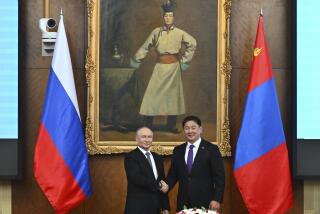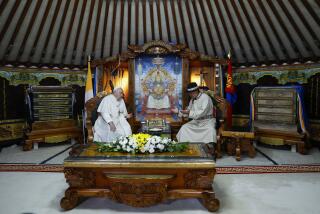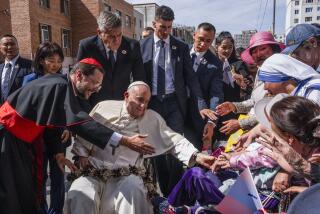Mongolian leader offers Buddhist insights
Mongolian President Nambaryn Enkhbayar is the leader of a small nation bordered by two powerful neighbors, Russia to the north and China to the south.
Enkhbayar, whose name means âPeaceful Joy,â is also a Buddhist and a man of letters who has translated sacred texts into his native language. He said Buddhism has much to teach the world about how to live together in peace in the 21st century.
âThe goal of a Buddhist is to perfect yourself,â said Enkhbayar, whose country is mostly Buddhist. âYou have to learn how not to blame others for the difficulties you face in your life. At the same time, the very important point that Buddhism makes is that you can find the way to make life better by peaceful means, not swords and arms, but good thoughts and good deeds.â
As part of his first visit to the U.S. as head of state, Enkhbayar was in Los Angeles this week on a campaign to attract more business for his developing nation of 2.5 million. He met with Mayor Antonio Villaraigosa, Lt. Gov. John Garamendi and business and community leaders, including members of the regionâs Mongolian community, which numbers about 2,500, said Grace Roberts, honorary consul of Mongolia in Los Angeles.
Enkhbayar made a $50,000 donation to the state as a gesture of sympathy for the victims of last weekâs wildfires. He also expressed the hope of establishing sister city relations between his capital, Ulan Bator, and Los Angeles and sending young Mongolians to study in California.
âLos Angeles is a door to Asia,â he said.
During a White House ceremony last week, President Bush thanked Enkhbayar and his people for their hospitality during the president and First Lady Laura Bushâs 2005 visit. Bush also thanked the Mongolian leader for his âstrong support in the war against radicals and extremistsâ and for his countryâs support of developing democracies in Iraq and Afghanistan.
Enkhbayar and Bush signed the Millennium Challenge Compact, awarding Mongolia a $285-million grant to help improve the countryâs transportation infrastructure and other projects.
âItâs an opportunity for the United States and our taxpayers to help countries that fight corruption, that support market-based economies and that invest in the health and education of their people,â Bush said.
In addition to Los Angeles and Washington, D.C., Enkhbayar and his entourage of more than 40 visited New York, Chicago and Alaska.
Enkhbayar, who has been president since 2005, said this is a time of opportunities and possibilities for his nation, large in territory but one of the most sparsely populated in the world with only 3.6 people per square mile, according to government statistics. He said Mongolia welcomes all visitors to enjoy its land of high mountains, deserts, forests and glacial lakes.
âWe have quite a rich culture and lifestyle,â he said.
A former literary translator and editor, Enkhbayar studied world literature in Russia, honed his English skills in Britain and translated Tolstoy and Dickens into his native language.
But after Mongolia was liberated from Soviet domination in 1990, Enkhbayar said, he left the world of literature for politics. Since then, he has served as prime minister, a member of the Mongolian parliament and minister of culture.
He said his decision to enter politics was influenced by his study of such classics as Tolstoyâs âResurrectionâ and Dostoevskyâs âCrime and Punishmentâ and âThe Brothers Karamazov.â
âLiterature is more than entertainment or amusement,â Enkhbayar said. âItâs about taking positions, making choices in your everyday life.â
The president -- whose economist wife, Tsolmon Onon Enkhbayar, heads an international group dedicated to preserving and raising awareness of the Mongol heritage -- also wants to broaden the image in the West of the legendary 13th century Mongolian warlord Genghis Khan, revered as the nationâs founding father.
In the West, he is known mostly as a brutal warrior, but he was also a statesman, Enkhbayar said.
âOf course, he set up an empire -- the largest in human history -- stretching from the Pacific to the Mediterranean, starting from northern India to Vietnam and to European boundaries,â the president said. âNot to justify his deeds, but the time was brutal.â
What hasnât been told, he said, is that Genghis Khan advocated peaceful coexistence among people of different religions. The ruler was a âmanagement geniusâ who established an effective system of governance, Enkhbayar said. He added that Western history was written by those conquered by Genghis Khan, so it reflected only one side of his place in world history.
âI think we will witness the time when he is rediscovered,â Enkhbayar said.
More to Read
Sign up for Essential California
The most important California stories and recommendations in your inbox every morning.
You may occasionally receive promotional content from the Los Angeles Times.










